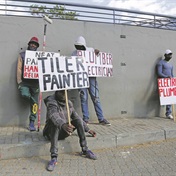
South Africa’s economy is expected to grow by 1.3% in 2023 and 1.4% next year, according to the latest International Monetary Fund (IMF) global economic outlook report.
The IMF’s projections are more optimistic than the Reserve Bank's latest growth forecast of 0.3% for 2023.
The country’s economy has been hammered by load shedding, which the central bank estimates will shave off 2% from annual growth this year. Government is now scrambling to find solutions to the energy crisis in Africa’s most developed economy.
Chief economist at Investec Annabel Bishop says investor sentiment has dipped in light of no clear solutions to end load shedding in the country.
"The persistence of load shedding has eroded investor confidence in the domestic economy, with no state solution to end the damaging effect on the economy in the near term, as we have been increasingly noting over this month."
READ: South Africa will only see growth of 0.3% this year, says Sarb
In his closing remarks to the ANC’s national executive committee (NEC) lekgotla on Monday, President Cyril Ramaphosa said there was talk of implementing a national state of disaster as it happened during the height of the Covid-19 pandemic.
Ramaphosa said:
"This matter will receive attention, including at the Cabinet Lekgotla, and must be resolved without delay. This proposal has been articulated in a number of consultations we have held with various stakeholders."
Inflation and rising interest rates have also added to the economy’s woes. Inflation risks remained tilted to the upside. Headline inflation is currently at 7.1% while food inflation was in the double digits at the last count. But electricity outages have increased the cost of food production, which can only mean that consumers will likely see food prices remain elevated.
The looming increase in the fuel price on the back of China coming back online and generating more demand for oil against a weakened exchange rate does not bode well for the domestic economy. Despite the slow growth, South Africa is expected to retain its position as the second-largest economy on the continent after Nigeria.
The rand traded weaker on Monday against major currencies and reached R17.41 against the US dollar in overnight trade on Tuesday morning, which translated to a 1.5% decline.
Bishop said: "The looming threat of stage 8 load shedding, and outages including stage 6 so far, have eroded confidence in the domestic economic outlook, with no government solution in sight in the near-term, pushing the rand weaker."
READ: Energy skills crisis
The IMF’s optimism extended to its outlook on global growth projections. It now estimates global growth will fall to 2.9% in 2023 from 3.4% last year but will rise to 3.1% in 2024. The 2023 outlook is 0.2 percentage points higher than predicted in the October 2022 World Economic Outlook. China’s reopening is expected to aid the global economy in a faster-than-expected recovery.
However, the escalation of the war in Ukraine, increased levels of debt distress particularly among emerging economies, elevated inflation and repricing of financial markets in response to lower inflation are some of the risks the IMF said weighed against global growth.
IMF chief economist Pierre-Olivier Gourinchas said: "Despite these headwinds, the outlook is less gloomy than in our October forecast and could represent a turning point with growth bottoming out and inflation declining. Economic growth proved surprisingly resilient in the third quarter of last year with a strong labour market robust private demand and better-than-expected adaptation to the energy crisis in Europe."
Gourinchas added that the slowdown would be much more pronounced among developed economies and growth would decline from 2.7% in 2022 to 1.2% this year:
"With tightening monetary policy and negative terms of trade shock due to the increase in the price of its imported energy, we expect growth to bottom out at 0.7% this year in the region. Emerging markets and developing economies have already bottomed out as a group with expected to rise modestly to 4% and 4.2% this year and next. With China’s economy reopening we project growth rebounding to 5.2% in 2023. Together, China and India will account for half of the growth this year, while the US and EU combined will account for 10% only," he said.
Global inflation is expected to remain above pre-pandemic levels at 6.6% in 2023 and 4.3% in 2024. Gourinchas said there were signs that recent interest rate hikes were starting to cool demand and inflation, but the full impact is unlikely to be realised before 2024.
He added that where inflation pressures remained high, central banks should keep real interest rates above the neutral stance and keep them there until core or underlying inflation was on a downward trajectory, as decreasing rates too soon could undo all the work done thus far.




 Publications
Publications
 Partners
Partners









